Visit Coquelicot Tasting Room to bring the Romance to Valentine's Day Celebrations with Organic Wine Collection

Nestled in the heart of wine country, Coquelicot Vineyards provides the perfect backdrop for love and enchantment this Valentine's Day.
A Toast to Love with the Best Organic Wine
Coquelicot Vineyards is not just an organic vineyard; it's a haven where each bottle of wine tells a story of passion, care, and nature's bounty. This Valentine's Day, in our Tasting Room we showcase our exclusive collection of organic wines, perfect for setting a romantic mood. From the crisp, refreshing notes to the deep, complex flavors of blend, each wine reflects the vineyard's dedication to quality and organic practices.
The Allure of An Organic Vineyard
At Coquelicot, the romance of Valentine's Day is amplified by the vineyard's picturesque landscape and commitment to organic viticulture. Strolling through the lush, green vines, one can't help but feel a deep connection to the land and the love that goes into nurturing every grape.
Planted in 1997, Coquelicot Estate, named after the French word for the red poppy flower, is also celebrated for our enchanting wine tours, including the renowned Black Oak Vineyard.. Since 2007, the vineyard has practiced sustainable and organic farming, achieving organic certification in 2015. This involves using natural methods for weed and disease control, encouraging biodiversity, and employing cover crops to enrich the soil, enhancing both the health of the vineyard and the quality of the wines. Coquelicot Estate exemplifies organic viticulture, harmoniously blending nature’s rhythm with the art of winemaking. This commitment to organic farming is not just about producing the best organic wine; it's about creating an environment where love, in all its forms, can flourish.
Sustainability Meets Romance
For those who value sustainability and natural living, Coquelicot Tasting Room, located at 2884 Grand Ave., Los Olivos is the ideal destination. Our commitment to organic practices means that every sip of wine is free from synthetic pesticides and fertilizers, aligning with a lifestyle that cherishes and respects the earth.
Conclusion
Valentine's Day at Coquelicot Tasting Room is more than just a celebration; it's an experience that embodies romance, nature, and the art of organic winemaking. With a stunning landscape, exquisite collection of the best organic wine, and commitment to sustainability, Coquelicot offers a unique way to celebrate love. Visit us at 2884 Grand Ave.,Los Olivos, CA 93441 and let the magic of this enchanting place and its wines add a special touch to your romantic celebrations.
Discover the Enchanting Experience of Coquelicot Tasting Room and Vineyard
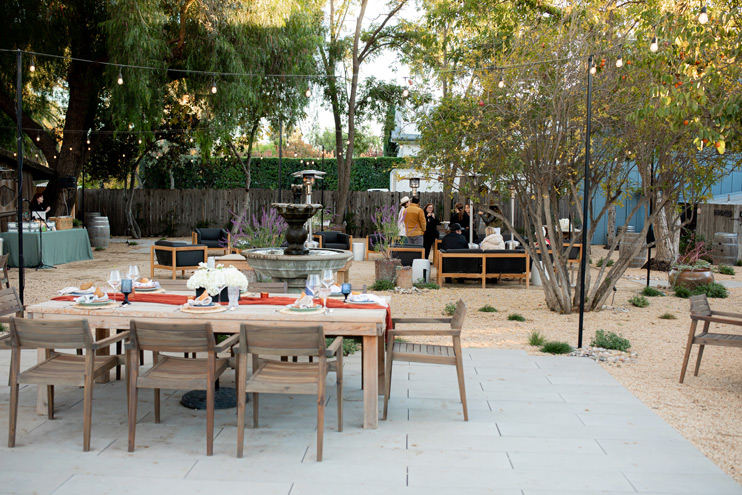
Nestled in the heart of the Santa Ynez Valley, the Coquelicot Tasting Room and Vineyard offers an enchanting experience for wine lovers and nature enthusiasts alike. This hidden gem, surrounded by rolling hills and lush vineyards, invites guests to indulge in the art of organic wine tasting while basking in the natural beauty of the Santa Ynez region. From the moment you arrive at Coquelicot, you will be captivated by the scenic vistas, the fragrant aroma of blooming flowers, and the serene ambiance that permeates the estate.
Savor the Flavors: Exploring the Exquisite Wines at Coquelicot Tasting Room
The wine tasting experience at Coquelicot is unlike any other. As a certified organic vineyard, Coquelicot takes great pride in producing wines that are not only delicious but also environmentally responsible. The vineyard's commitment to sustainable farming practices ensures that the wines produced here are of the highest quality, while also preserving the natural beauty of the region.
Upon entering the tasting room, you will be greeted by knowledgeable and friendly staff who will guide you through a curated selection of Coquelicot's finest wines. From crisp whites to robust reds, each wine showcases the unique terroir of the Santa Ynez Valley and reflects the care and attention to detail that goes into every bottle. Whether you are a seasoned wine enthusiast or a novice looking to expand your palate, the Coquelicot Tasting Room offers a diverse selection of wines that will delight your senses and leave you eager to explore more.
A Journey through the Vineyards: Discovering the Terroir of Coquelicot
The terroir of a wine region plays a crucial role in shaping the flavors and characteristics of the wines produced there. At Coquelicot, the terroir is influenced by a combination of factors, including the climate, soil, and topography of the Santa Ynez Valley. The vineyard is located in a region known for its warm days and cool nights, which allows the grapes to ripen slowly and develop complex flavors. The soil, a mix of sandy loam and clay, provides excellent drainage and contributes to the concentration of flavors in the grapes.
As you embark on a journey through the vineyards at Coquelicot, you will have the opportunity to learn about the various grape varieties grown here and the winemaking process from vine to bottle. The knowledgeable guides will share interesting anecdotes and insights about the history of the vineyard and the challenges and rewards of organic farming. As you wander through the rows of vines, you can't help but feel a sense of connection to the land and an appreciation for the dedication and passion that goes into crafting each bottle of Coquelicot wine.
Beyond Wine: Unforgettable Experiences at Coquelicot Tasting Room and Vineyard
While the wines are undoubtedly the main attraction at Coquelicot, the estate offers a range of unforgettable experiences that go beyond wine tasting. Guests can explore the beautiful grounds, relax in the garden, or enjoy a picnic on the lawn. The estate also hosts a variety of events throughout the year, from wine and food pairing dinners to live music performances and art exhibitions.
For those looking to immerse themselves in the world of winemaking, Coquelicot offers a "Vineyard and Winery Tour" that includes a guided tour of the vineyard, winery, and barrel room, followed by a tasting of their current releases. This behind-the-scenes experience provides a deeper understanding of the winemaking process and the opportunity to taste the wines in the very place they were created.
Useful Tips:
- Coquelicot is open for wine tasting from Thursday to Monday, 11 am to 5 pm. Reservations are recommended, especially on weekends and during special events.
- Don't forget to bring a hat and sunscreen as the sun can be quite strong in the Santa Ynez Valley.
- If you plan on enjoying a picnic on the grounds, be sure to pack your own food as there are no restaurants on-site.
Conclusion: Embark on a Memorable Wine Journey at Coquelicot Tasting Room and Vineyard
Coquelicot Tasting Room and Vineyard offers a truly enchanting experience for those looking to explore the world of organic wine tasting in Santa Ynez. From the breathtaking scenery to the exquisite wines and unforgettable experiences, Coquelicot promises a memorable journey that will leave you inspired and rejuvenated. So, gather your friends and family, pack a picnic, and embark on a wine adventure like no other at Coquelicot Tasting Room and Vineyard.
About the Vineyard
The Coquelicot Estate, named after the French red poppy flower, is a 94-acre organic vineyard located in the Los Olivos District, AVA, between Ballard Canyon and Happy Canyon, south of Mission Santa Inés and east of Solvang. The estate has Ballard gravelly fine sandy loam soil, which is well-drained and nutrient-poor, leading to deeper root systems and wines that transparently showcase varietal characteristics in a favorable climate. The microclimate is temperate, similar to Bordeaux, with less rainfall, influenced by the proximity of east-west mountain ranges, the Santa Ynez Mountains and the San Rafael Mountains, which allow coastal breezes to cool the vineyard. This unique location results in a longer growing season with significant temperature swings, preserving acidity while achieving phenolic ripeness.
Coquelicot implemented sustainable and organic farming protocols in 2007 and received organic certification from the California Certified Organic Farmers association in 2015. Organic grape growing at Coquelicot involves resisting synthetic pesticides and fertilizers, using biodegradable mineral oil instead of chemical fungicides, practicing regenerative farming, and promoting biodiversity to eliminate the need for insecticides. Cover crops, including grasses, legumes, and mustards, are planted to prevent soil erosion, introduce nutrients, provide habitat for beneficial insects, and discourage soil-borne nematodes. This approach contributes to soil health, vine quality, and reflects a deep commitment to organic agriculture.
Celebrate National White Wine Day with Refreshing and Delicious Wine Varieties by Coquelicot Estate Vineyard
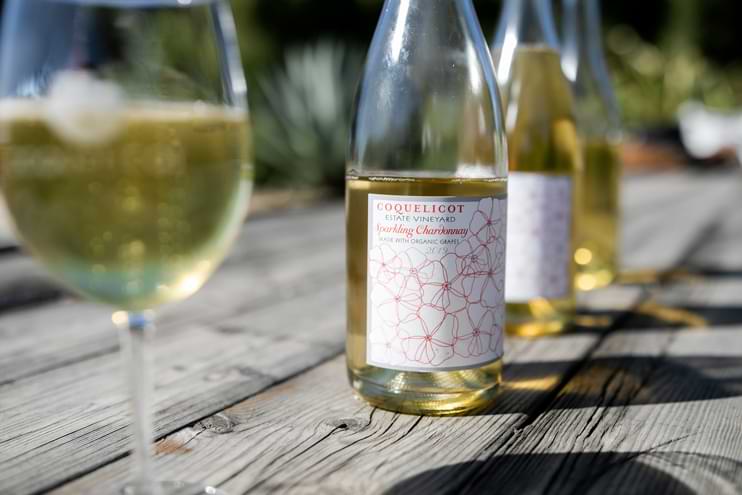
National White Wine Day is a day to celebrate the rich history, diversity, and deliciousness of white wines. You are invited to visit our signature Coquelicot Tasting Room, located at 2884 Grand Ave., Los Olivos, CA 93441,in the lush Santa Ynez Valley, is thrilled to share some insights into organic white wine, perfect food pairings, and tips to enjoy this vibrant beverage. Join us in a toast to these delectable wines!
What is National White Wine Day and Why Should You Celebrate it?
National White Wine Day, celebrated annually on August 4th, is a joyous occasion to appreciate the elegance and variety of white wines. For enthusiasts and novices alike, this day is about exploring new flavors and revisiting old favorites. With a growing trend towards organic and sustainably produced wines, there's never been a better time to dive into the world of organic white wine.
Why celebrate it? White wine is not just a beverage; it's a symbol of culture, a testament to the craftsmanship of wineries like those in Santa Ynez, and a way to connect with friends and family over a shared passion. Coquelicot Estate Vineyard, with its commitment to organic farming, proudly joins in this celebration.
A Guide to the Different Types of White Wine and Their Characteristics
White wines are as varied as the regions they come from. At Coquelicot Estate Vineyard, we specialize in crafting organic white wine, and we're delighted to share some popular varieties:
- Chardonnay: Known for its richness and complexity, Chardonnay offers flavors ranging from apple to tropical fruits, with the oak-aged versions adding notes of vanilla.
- Sauvignon Blanc: This crisp and refreshing wine features lively acidity, often showcasing flavors of green apple, lime, and herbs.
- Riesling: A versatile wine that can range from dry to sweet, Riesling offers flavors of peach, apricot, and honey.
- Pinot Grigio: Light and simple, Pinot Grigio is perfect for those who enjoy subtle flavors of pear and apple.
These are just a few examples, and the world of white wine offers a multitude of choices, especially among the wineries in Santa Ynez.
Food Pairings: Discover the Perfect Combinations for Your Favorite White Wines
Choosing the right food to pair with your wine can elevate your dining experience. Here's a guide to some classic pairings:
- Chardonnay: Rich seafood like lobster, or creamy pasta dishes.
- Sauvignon Blanc: Light salads, goat cheese, or grilled chicken.
- Riesling: Spicy foods, especially Asian cuisine.
- Pinot Grigio: Light fish dishes or simple bruschetta.
At Coquelicot Estate Vineyard, we pride ourselves on offering organic white wine that pairs beautifully with a variety of cuisines.
Tips for Serving and Enjoying White Wine at Its Best on National White Wine Day
Savoring white wine at its finest involves more than just pouring it into a glass. Here are some tips:
- Chill but Don't Over-chill: White wine should be served cool but not ice-cold, as over-chilling can mute flavors.
- Choose the Right Glass: A glass with a larger bowl allows the aromas to circulate, enhancing the flavor.
- Consider Organic: Organic white wines, like those from Coquelicot Estate Vineyard, offer purity in taste and are often produced with sustainability in mind.
- Explore and Experiment: Try different wines from various wineries in Santa Ynez or your local area. Experiment with food pairings and find what delights your palate.
Conclusion
National White Wine Day is more than just a date on the calendar; it's an invitation to explore the world of white wines, be it through trying a new varietal, experimenting with food pairings, or simply enjoying a glass with loved ones.
Coquelicot Estate Vineyard is honored to be part of this celebration. With our commitment to organic farming and crafting extraordinary white wines, we invite you to raise a glass with us. Visit us at our Tasting Room located in Los Olivos and explore the organic white wine offerings at wineries in Santa Ynez and make this National White Wine Day a memorable one. Cheers!
About Coquelicot Estate Vineyard
At Coquelicot Estate Vineyard, the approach to winemaking emphasizes organic techniques, allowing the grapes to develop without additives or enhancements, resulting in wines low in sulfur. Our commitment to natural wines involves limiting environmental impact, prioritizing healthy farming systems, and obtaining a CCOF certification for organic practices. The wines produced are hand-made, bold, and elegant, crafted in small batches in the heart of Santa Ynez Valley.
The vineyard, named after the French red poppy flower, spans 94 acres in the Los Olivos District, AVA, with soil well-drained and lacking in nutrients, leading to transparent wines showing varietal characteristics. The temperate microclimate, similar to Bordeaux, and the unique east-west mountain ranges allow coastal breezes that create a longer growing season, contributing to the distinctive style of wine. Our location's dramatic temperature swings help preserve acidity while achieving phenolic ripeness.
Since 2007, Coquelicot Estate Vineyard has adopted sustainable and organic farming protocols, earning organic certification in 2015. Our dedication to organic grape growing extends beyond merely avoiding synthetic pesticides and fertilizers. By practicing regenerative farming and using natural substances like mineral oil derived from stylet flowers, our vineyard ensures healthy microorganisms and soil. The usage of cover crops, including grasses, legumes, and mustards, enriches the soil, protects against erosion, and creates a habitat for beneficial insects. This extensive, holistic commitment to organic farming showcases the vineyard's deep-rooted belief in working harmoniously with nature. Visit us today at Coquelicot Tasting Room, located at 2884 Grand Ave., Los Olivos, CA 93441 to learn more about our delicious wine.
Your Guide to Organic Wine | Coquelicot Estate Vineyard
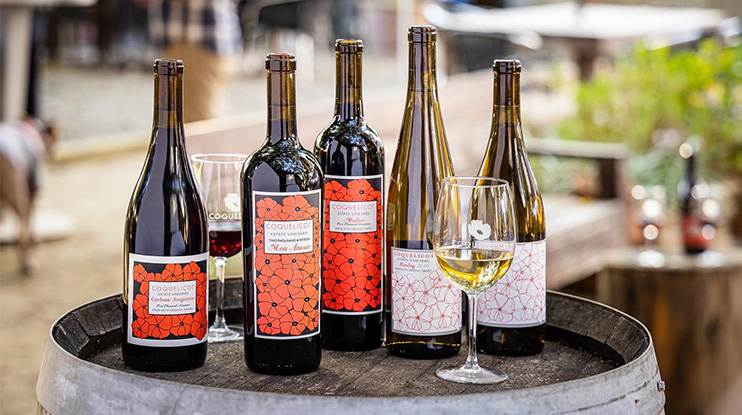
For the uninitiated, organic wine may seem like just another trendy label. However, behind this tag lies a world of difference in terms of production, taste, and environmental impact. Simply put, organic wine refers to wine made from organically grown grapes without the use of artificial or synthetic chemicals, including pesticides, herbicides, fungicides, or fertilizers.
In contrast, commercial wines often involve the use of these chemicals in the grape-growing process, as well as additives in the winemaking process, including sulfur dioxide for preservation and additional sugars to modify the taste. An organic vineyard, such as Coquelicot Estate Vineyard, commits to sustainable practices that respect the environment and result in a more natural-tasting wine.
How to Choose the Right Organic Wine for Your Palate
Choosing the right organic wine depends on personal taste. Organic wines are as diverse as their conventional counterparts, ranging from robust reds to crisp whites. If you are a fan of Chardonnay, for example, the best organic wine Chardonnay might have the familiar buttery, fruity, or oaky notes, but also exhibit more nuanced characteristics due to the organic grapes' quality and the more natural winemaking process.
Explore different varieties from reputable organic vineyards and don’t be afraid to ask for recommendations. Most importantly, take note of what you enjoy – the best wine for you is the one that makes your taste buds sing.
The Benefits of Drinking Organic Wine
Besides offering a more natural taste profile, organic wines provide several other benefits. By avoiding synthetic chemicals, organic wines tend to have fewer sulfites, which can cause allergic reactions in some people. The absence of pesticide residues also makes organic wine a healthier choice.
Perhaps the most significant advantage lies in the sustainable practices of organic vineyards. By working in harmony with nature, these vineyards protect biodiversity, maintain soil health, and reduce carbon emissions, making each bottle of organic wine a toast to the planet’s well-being.
Supporting Sustainability with Organic Wine
Choosing organic wine isn't just a matter of personal health or taste preference - it's a vote for a more sustainable future. Organic vineyards play a crucial role in promoting biodiversity, preserving soil quality, and combating climate change by reducing reliance on synthetic chemicals and promoting natural farming methods.
Even the smallest decisions can make a difference. By choosing organic wine, you're not just selecting a beverage; you're supporting a cause. You’re part of a movement that values quality, health, and the environment, all in a deliciously drinkable form.
Organic Wine Certification and Labeling
Wines labeled as organic must meet strict certification standards. In the United States, the USDA’s National Organic Program (NOP) sets these standards, which include requirements for organic grape growing, winemaking processes, and even the type of cleaning agents used in the winery.
However, it's important to note that not all wines made with organic practices are certified due to the cost and complexity of the certification process. Some smaller vineyards may opt to follow organic practices but forgo official certification. When in doubt, do your research, or better yet, visit the vineyard and ask!
Understanding the Organic Winemaking Process
The winemaking process for organic wines is as crucial as the organic farming methods. The emphasis is on minimal intervention, allowing the grapes' natural flavors to shine through. In keeping with the organic ethos, winemakers minimize or entirely forego additives such as artificial yeast, sugar, and sulfur dioxide, which are commonly used in conventional winemaking to control fermentation and enhance the wine's flavor and stability.
One of the key points in organic winemaking is the use of natural yeast for fermentation. Unlike commercial wines, where winemakers often use cultured yeast, organic wine relies on the yeast naturally present on the grape skins, resulting in a wine that is a true expression of the vineyard's terroir – the unique combination of soil, climate, and topography where the grapes are grown.
Organic Wine Tasting
Tasting organic wines can be an exciting and enlightening experience. Without the influence of synthetic chemicals and heavy manipulation, organic wines tend to express more clearly the characteristics of the grape variety and the terroir. The best organic wine Chardonnay, for instance, can exhibit an incredible array of flavors and aromas, reflecting not just the grape variety, but also the specific soil and climate of the vineyard where it was grown.
A visit to an organic vineyard can deepen this experience. Walking among the vines, you can see first-hand the sustainable farming practices in action, from the cover crops that naturally fertilize the soil to the absence of synthetic pesticides. And in the winery, you can witness the careful, minimal-intervention methods that go into making each bottle of organic wine. It’s an education for the senses that makes each sip even more enjoyable.
Organic Vs. Non-Organic - The Pros & Cons
While organic wines bring a host of benefits, they also have challenges. For instance, organic grape farming is labor-intensive and often yields a smaller harvest, which can make organic wines pricier. Also, organic wines may have a shorter shelf life due to the lower sulfur content.
On the other hand, conventional wines may offer a more consistent taste and wider availability, but the use of synthetic chemicals can be harmful to the environment and possibly to our health.
In the end, the choice between organic and non-organic wine often boils down to personal preference and values.
Where You Can Find the Best Selection of Organic Wines
Organic wines are growing in popularity and can now be found in most wine shops and many restaurants. However, for the best selection, consider visiting an organic vineyard like Coquelicot Estate Vineyard. Here, you can enjoy a tasting tour, learn about organic winemaking, and explore a variety of outstanding organic wines, including some of the best organic wine Chardonnay.
Conclusion
Organic wines offer a beautiful fusion of taste and sustainability. By choosing organic, you not only enjoy a wine that’s more in tune with nature but also support practices that benefit the environment. Whether you are a seasoned wine enthusiast or a casual sipper, exploring the world of organic wine can add a new dimension to your wine experience.
From the vineyard to the winery, from the certification process to the tasting experience, organic wine offers a unique journey that's as pleasing to the palate as it is to the planet. Whether you're a die-hard Chardonnay fan seeking the best organic wine Chardonnay, or a wine adventurer eager to explore different organic varieties, there’s an organic wine out there that's just right for you. So here's to organic wine – a toast to taste, health, and sustainability in every glass!
About Coquelicot Estate Vineyard
Coquelicot Estate Vineyard, located in the Los Olivos District, AVA, is a 94-acre vineyard named after the French red poppy flower. The vineyard was planted in 1997, boasting a Ballard gravelly fine sandy loam soil that is well-drained and nutrient-lacking. This soil stress promotes deeper root systems and enables the wine to express distinct varietal characteristics. The vineyard's unique microclimate, similar to Bordeaux's, is influenced by its proximity to east-west mountain ranges that allow coastal breezes to cool the vineyard. Dramatic day-to-night temperature swings contribute to preserving the grapes' acidity while allowing phenolic ripeness, resulting in a longer, temperate growing season. The vineyard adopted sustainable and organic farming protocols in 2007 and was certified organic by the California Certified Organic Farmer association in 2015. Organic farming practices at Coquelicot Estate involve using natural means to manage pests and enrich the soil, fostering a bio-diverse farm landscape that promotes the health of both the soil and the vines.
Best Los Olivos Catering Venue for a Unique Event - Coquelicot Estate Tasting Room & Garden
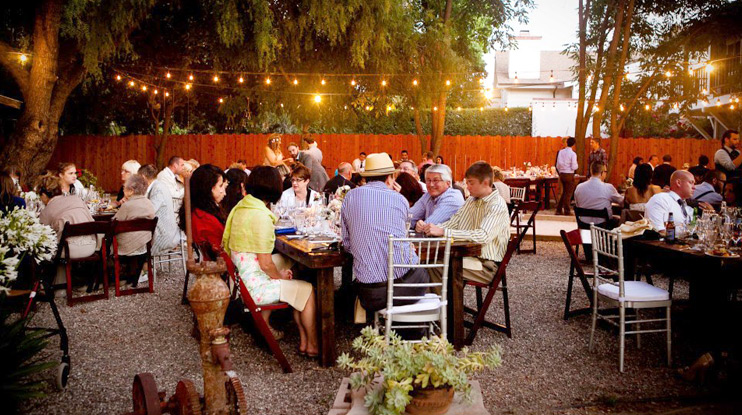
Looking for the perfect venue to host your special event - spacious enough to accommodate your guests and versatile enough to let you get creative? Coquelicot Estate Tasting Room in Los Olivos is the perfect place for your next special event. Your guests will enjoy best organic wines and great company, and they'll be talking about your event for years to come.
Located in the heart of Los Olivos, CA, Coquelicot Tasting Room offers the beauty and ambiance. With a stunning tasting room and a gorgeous outdoor garden, our venue is perfect for events of any kind. We've proudly hosted hundreds of private events and are the premiere catering venue in the Santa Ynez area.
We pride ourselves on being more than just a venue. We offer one-stop-shop services to make planning your event a breeze. From catering and entertainment to chairs and tables, we have everything you need to make your event perfect. Our stunning tasting room and gorgeous outdoor garden are sure to impress every single guest that walks through the door. And our selection of best organic wines will ensure that your event is truly unforgettable.
Wedding Receptions
Imagine walking down the aisle in a stunning tree-lined garden, exchanging vows with the person who makes you complete. After your outdoor ceremony, you and your guests will party together, dining at candle-lit tables, dancing under twinkle-lit trees, and sipping elegant organic wines. Our unique setting can only be described as "a truly magical setting for your picture-perfect day!
Wedding receptions and rehearsal dinners
Our central location in Los Olivos is just minutes from hotels, restaurants, and shopping, making it easy for you and your guests to enjoy everything our town has to offer. Wedding rehearsal dinners can be booked all year round, with each season offering a different ambiance within the garden to cherish and remember. We can accommodate seated receptions for up to 200 guests or cocktail receptions for up to 300 guests.
Corporate meetings
With more groups heading out of the boardroom and into a creative catering venue, why not schedule your corporate retreat in a cozy space with great food and a wine tasting guided by a sommelier? Our wine-tasting room proves that groups don't have to head to boring venues for corporate retreats or meetings. Our intimate yet spacious, private tasting room can accommodate various seating configurations to foster a creative environment. Enjoy a dedicated bar and service from our gracious hospitality team. Let your creative juices flow during the day with breakout sessions next to the vines and network during the custom wine blending class.
Leave the busy city life behind and host your next corporate event at our stunning catering venue.
Life celebrations
For a special occasion, you need a special venue. We offer a variety of options to suit your needs: from subdued elegance to bright cheerfulness or ceremonious festiveness. Farm tables and a spacious outdoor venue make our garden the perfect place to host your next birthday or anniversary celebration. With its lovely atmosphere, it's sure to be a success!
Planning an event is more than just finding the right time, place, and people. It's also about the small details that make the event truly special. That's why we offer a wide range of services to make your event stand out. We have a cozy tasting room for intimate gatherings, a laid-back atmosphere while sipping best orgnaic wines, and a garden with green grass and trees for a more natural setting. No matter what you're looking for, we can create something special for you.
Understanding The Difference Between the Organic Wine and Biodynamic Wine
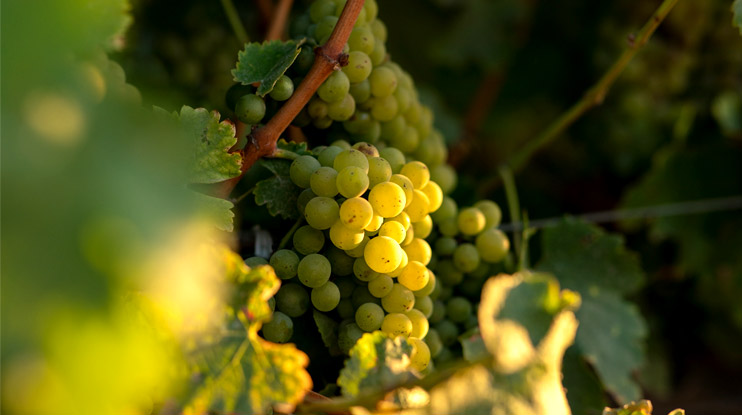
Wine has been around for centuries, and over the years, its manufacturing methods have been adjusted to keep up with the growing demand and mass production requirements. As a result, some wines suffer in terms of quality and are unable to truly express the flavor and features of the grape. But California organic wines—especially those that come from certified organic vineyards and wineries—beg to differ.
Types of wine
You may be wondering if biodynamic wines are different from organic wines. The simple answer is yes. To understand their dissimilarities, it’s important to understand the four different types of wine in the market today and how each one is defined.
1. Organic wine
Organic wines have no added sulfites and are made using Certified Organic grapes in a certified organic vineyard. Certified Organic grapes are grown without herbicides, pesticides, and chemical fertilizers applied.
Do note that this definition is only applicable in the US. Other countries may have their own definitions of “organic wine”, and in some cases, they may contain carefully regulated and monitored sulfites to maintain quality and stability.
You can find the best organic wine from a CCOF certified organic winery. These wines are made without any harsh chemicals, resulting in whites that are vibrant and refreshing and reds that are soft and velvety.
2. Organically Grown
Some California organic wines are “organically grown”, which means that they were made with organic grapes, with carefully-regulated sulfites added.
3. Natural wines
These are sustainable or eco-friendly wines that are shown as being manufactured in a more conscious way compared to conventionally-manufactured wines. They are cleaner with fewer chemicals, with regulated SO2. That said, no official regulating third-party agencies are assessing the quality of this type of wine. This is why there are no assessment standards and no exact definition for ‘natural’ wine.
4. Biodynamic wine
Biodynamic wine is produced following the Demeter Institute's standards and is likewise certified by the same organization. The standard requires Certified Organic grapes with a planting and harvesting schedule, which is dictated by a biodiverse environment and moon cycles. This way, the vineyard becomes its own thriving ecosystem.
Biodynamic certification allows regulated SO2 levels in the wine. Although biodynamic wines are often more expensive than certified organic wines, their care of animal species and focus on the environment make them quite popular with environmentally-conscious consumers.
So what is the difference between organic and biodynamic wine?
Going by these definitions, organic wines are derived from grapes grown without synthetic pesticides, fertilizers, or herbicides. Additionally, all the ingredients are certified.
On the other hand, biodynamic wine has a heavier emphasis on organic processes and ingredients, including the interconnectivity of the earth, the solar system, and our planet. Biodynamic farming practices were pioneered in the 1920s by Rudolf Steiner, an Austrian philosopher. They involve the use of an astronomical calendar to time the stages of farming, harvesting, watering, and pruning. The vineyard is also allowed to ‘rest.’ You can easily identify biodynamic wine by its official seal from Demeter or Bidyvin on the label.
Why is organic wine better?
There are fewer additives in the best organic wine and there are no harsh chemicals. This results in a more refreshing and flavorful wine that simply tastes better, according to many experts. You’re more likely to notice and appreciate the grape’s flavor and varietal in organic wine, too.
Where can you buy organic wine?
Be sure to buy California organic wines from a certified organic vineyard and CCOF certified organic winery like Coquelicot Estate Vineyard.
5 Reasons Why Drinking Organic Wine Is A Healthier Choice
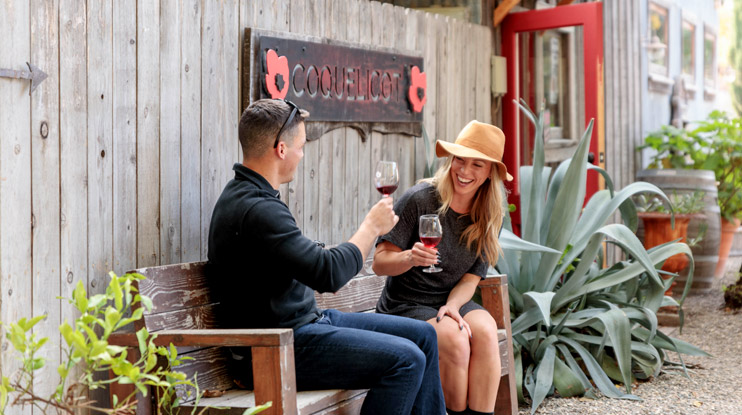
Studies continue to prove the health benefits of drinking wine when taken in moderation. Although all types of wines can be healthy, California organic wines and other organic wines are said to be even better. Here are five reasons why.
1. More antioxidants
Red wines are especially rich in resveratrol, a polyphenol or powerful antioxidant that’s found in the grape skin and juice. Antioxidants help your body fight off toxins and free radicals that can damage your organs and cells.
According to studies, resveratrol promotes longevity and health by increasing the activity of sirtuins, proteins that protect your body against aging diseases. Several studies also suggested that drinking wine may lead to longer life spans, as long as it’s consumed moderately. So, if you want to improve your immunity against age-related diseases, make room for California organic wines in your diet. Be sure to drink it moderately.
2. Improve brain health
Our memory naturally declines as we age, but some people develop Alzheimer’s and dementia. Memory decline and other poor memory conditions may be prevented by the nutrients found in the best organic wine.
Dementia is a persistent or chronic disorder of the mental process that gradually occurs during old age. Studies found that drinking wine can help reduce the risk of developing that condition, including Alzheimer’s. This effect is attributed to the high levels of resveratrol in wines. The antioxidant helps keep blood vessels open to ensure the proper delivery of glucose and supply to the brain. And if you want to drink wine and make new memories, you might want to consider booking a visit to one of the best wineries in Santa Ynez.
3. Improve mood
Depression is a serious disorder that can negatively impact the way you think, feel, and deal with daily activities. It may sound contradictory, but alcohol consumption—particularly a glass of wine every now and then—has been shown to help improve its symptoms.
PREDIMED conducted a seven-year study of 5,500 light to moderate drinkers and discovered that those who drank two to seven glasses of wine in one week were less prone to depression than those who didn’t. That said, you should drink in moderation as heavy drinking can worsen the condition. Avoid taking antidepressants with wine, too.
And if you’re feeling a bit down, perhaps visiting one of the best wineries in Santa Ynez to unwind and enjoy nature could also lift your spirits.
4. Healthier skin
Drinking alcohol is known to dehydrate skin, but moderate consumption of organic wines may help improve the signs of skin aging. That’s because of the high antioxidant content in wines. Wine also stimulates blood circulation to prevent skin aging and wrinkle formation. When applied directly to the skin, the best organic wine can prevent acne-causing bacteria, rejuvenate skin, create a natural glow, and increase skin elasticity.
5. Boost immunity
Researchers found that drinking wine daily may improve the immune system because it’s rich in antioxidants. Ethanol, a chemical component of wine and alcoholic beverages, is also found to help boost the potency of vaccinations.
Discover more of the benefits of organic wines at Coquelicot Estate Vineyard. We’re a certified organic vineyard and our winery is CCOF Certified Organic, too. That means there are no harsh chemicals in our winemaking process.
Wine 101: Sangiovese & Carbonic Maceration
Wine 101 Sangiovese & Carbonic Maceration
Sangiovese, the most planted variety in Italy, accounting for about 10 percent of the country's total vineyard acreage, is especially prominent in Tuscany, its presumed region of origin. This grape has a rich history, with documentation dating back to the sixteenth century. Notably, the technique of carbonic maceration has been applied to Sangiovese, enhancing its unique profile. Outside Italy, Sangiovese is grown extensively in the Mendoza province of Argentina, increasingly in California where carbonic maceration is also being experimented with, and to a limited extent in Australia. The history of Sangiovese in California stretches back to about 1880, where innovative winemaking techniques like carbonic maceration are bringing new dimensions to this traditional variety.
Wines made from Sangiovese tend to exhibit the grape's naturally high acidity as well as moderate to high tannin content and light color. Blending can have a pronounced effect on enhancing or tempering the wine's quality. The dominant nature of Cabernet can sometimes have a disproportionate influence on the wine, even overwhelming Sangiovese character with black cherry, black currant, mulberry and plum fruit.
Different regions will impart varietal character on the wine with Tuscan Sangiovese having a distinctive bitter-sweet component of cherry, violets and tea. In their youth, Tuscan Sangiovese can have tomato-savoriness to it that enhances its herbal component. Californian examples tend to have more bright, red fruit flavors with some Zinfandel-like spice or darker fruits depending on the proportion of Cabernet blended in. Argentine examples showing a hybrid between the Tuscan and California Sangiovese with juicy red fruit wines that end on a bitter cherry note.
A Food Friendly wine, this is due to Sangiovese's high acidity and moderate alcohol. One of the classic pairings in Italian cuisine is tomato-based pasta and pizza sauces with a Sangiovese-based Chianti. Varietal Sangiovese or those with a smaller proportion of the powerful, full-bodied Cabernet blended in, can accentuate the flavors of relatively bland dishes like meatloaf and roast chicken. Herb seasoning such as basil, thyme and sage play off the herbal notes of the grapes. Sangiovese that has been subject to more aggressive oak treatment pairs well with grilled and smoked food.
Carbonic maceration is a form of whole bunch fermentation, when whole bunches of uncrushed grapes are used in fermentation of red wines. Conventional alcoholic fermentation involves crushing the grapes to free the juice and pulp from the skin with yeast serving to convert sugar into ethanol. Carbonic maceration ferments most of the juice while it is still inside the grape, although grapes at the bottom of the vessel are crushed by gravity and undergo conventional fermentation. The resulting wine is fruity with very low tannins. Some key flavors associated with carbonic maceration would be: Bubble gum, Kirsch, Banana, Strawberry
How it works Whole bunches of grapes are placed in vats, which are then sealed and filled with CO2 to remove the oxygen. This triggers a process within the grapes known as intracellular fermentation. Once alcohol levels reach around 2% abv, the grape skins split and release their juice. Carbonic maceration extracts some color from the grapes but little tannin, generally creating red wines that are light in color, low in tannin and which have a soft, fruity wines character. Wines made in this style include Beaujolais Nouveau and are often best when drunk young and sometimes even lightly chilled.